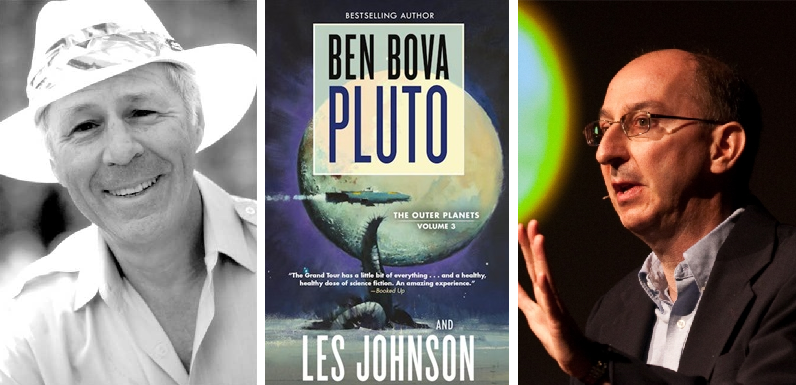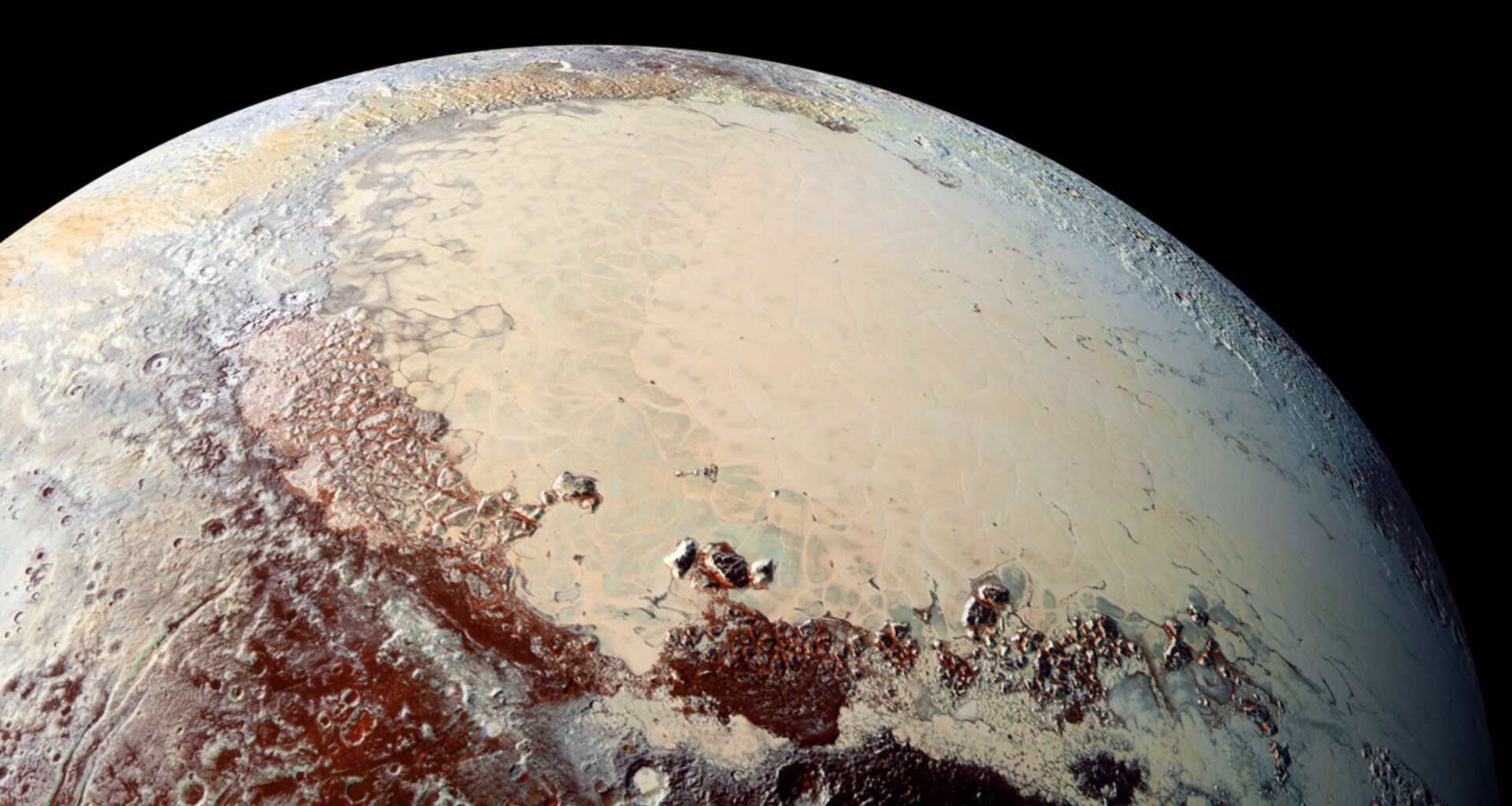NASA’s New Horizons mission to Pluto has forced astronomers to rewrite their textbooks — but that’s not all: New Horizons also forced Les Johnson to rewrite a novel.
The space scientist was tasked with taking notes that the famed science-fiction writer and editor Ben Bova left behind when he died in 2020, and turning them into a novel set on Pluto to close out Bova’s Grand Tour series of solar system tales.
In the material that Bova had written for “Pluto,” he described a rocky world with just a little bit of ice on it. But when Johnson sent those notes to planetary scientist Alan Stern, the New Horizons mission’s principal investigator, had to set him straight.
“His first comment back to me was, ‘We never found anything on Pluto that was anything like that,’” Johnson says in the latest episode of the Fiction Science podcast. “And so I realized at that point that I was going to have to go back and revise the science behind the story of the environment on Pluto.”
The result is one of the first works of fiction that provides detailed descriptions of Pluto’s true surroundings, right down to the orange-tinged ice sheet of Sputnik Planitia and the dark and dirty spot on Charon, Pluto’s largest moon.
“Pluto” capitalizes on Johnson’s experience as a NASA researcher as well as an author of nonfiction science books, science-fiction novels and short stories. He was chosen to complete Bova’s final project in part because the two of them collaborated on an earlier novel, “Rescue Mode,” more than a decade earlier.
To be sure, there’s a lot of fiction blended in with the science in “Pluto.” The mix roughly reflects the proportion of rock to ice on the dwarf planet: 30% solid stuff, and 70% that’s not as weighty but very cool. The novel is set in the 22nd century, when humans are starting to merge with machines and get data back from Proxima Centauri b.
The spark that sets the novel’s plot in motion is the detection of an alien artifact deep beneath the icy surface of a Plutonian region known as Sputnik Planitia. Scientists and military leaders from the U.S. Space Force, China and Russia struggle to deal with the events that are set in motion by that discovery — and there’s even a shipboard romance that develops between two of the novel’s main characters.
“Pluto is the background for the book, and what they find on Pluto is the source of the drama in the book,” Johnson says. “But I had another objective in this, and I think Ben was going there. And that is that as we expand into the solar system, we won’t necessarily be leaving back here on Earth our humanity, both the good and the bad. Our rivalries, our personal tragedies, as well as temptations … will go with the folks that take these arduous, long trips.”
 Ben Bova (left) and Les Johnson (right) are authors of “Pluto,” the last novel in Bova’s Grand Tour series. (Credit: Tor Books)
Ben Bova (left) and Les Johnson (right) are authors of “Pluto,” the last novel in Bova’s Grand Tour series. (Credit: Tor Books)
Johnson suspects that the Space Force and other military fleets will be part of the space exploration saga, even in the 22nd century.
“I can imagine, in 100 years, maybe 200 years, the U.S. may not be the same U.S. we are today, but I envision it’ll still be around,” he says. “Maybe we’ll be bigger, with other countries having joined, to be morphed into something. But I suspect China will be around, and I suspect Russia will be around, and probably India will be a space power in that day.”
A couple of other twists in the novel reflect Johnson’s suspicions about life in the 22nd century. For example, one of the characters is a scientist who went through a horrible accident and had to have his brain merged with an AI. “He’s essentially a digital consciousness that can transfer from machine to machine and retain his self, his human volition and thoughts, augmented by AI,” Johnson says.
If such an entity ever comes into existence, Johnson thinks that could pose a problem. “I think it’s going to be extremely utilitarian, and I think it will want to make decisions based on utility rather than compassion and humanity,” he says. “And I think those kinds of things might be an issue if we ever do achieve this notion of uploading human consciousness. Will we still have our humanity and our empathy, or will we also become utilitarian?”
In another passage of the book, Johnson works in a reference to VR addiction — which may be scarily close to a present-day societal ill.
“I am extremely concerned by it,” Johnson says. “This has been the focus of some of my nonfiction writing as well as my fiction. I really see how much our younger generation — young men in particular, not exclusively — are seduced by online gaming, and it takes away a lot of the desire to go out and actually do things.”
So, where does Johnson stand on a completely different controversy? Is Pluto a planet, or isn’t it? Johnson says he’s OK with calling Pluto a dwarf planet rather than a “full-blown planet.”
“It’s just a matter of nomenclature for me, because as we found all these other objects out there in the Kuiper Belt which are Pluto-like … they had to do something when they started encountering all these other objects,” he says. “I’m excited by all these other dwarf planets that we see beyond Pluto, and I don’t have too much trouble classifying Pluto in with that.”
Johnson hopes that “Pluto” will leave readers with a sense of wonder.
“That would be my mental model of what I would like readers of this book to say to themselves when they finish it: ‘Wow, what is out there?’” he says. “The scientist in me, the one who’s worked at NASA for 35 years and just retired, wants to tell them, ‘Great, I want to help answer that. Go tell your congressman to send more money so we can figure out what’s out there.’ So I have to admit, there’s a bit of a selfish mode in there.”
Check out the original version of this item at Cosmic Log for more about books that focus on Pluto, Ben Bova’s Grand Tour and Les Johnson’s insights on interstellar flight.
Les Johnson retired from his day job as chief technologist at NASA’s Marshall Space Flight Center in September, but he’s still involved in the space business as CEO of Infinite Frontiers Consulting. His most recently published science-fiction novel, “Crisis at Proxima,” was written in partnership with Travis S. Taylor and has just come out in paperback. He’s currently working on his next novel — “Monster Hunter: The Alien Files,” co-written with Larry Correia — as well as an upcoming nonfiction book about space exploration.
Fiction Science is included in FeedSpot’s 100 Best Sci-Fi Podcasts. Stay tuned for future episodes of the Fiction Science podcast via Apple, Spotify, Player.fm, Pocket Casts and Podchaser. If you like Fiction Science, please rate the podcast and subscribe to get alerts for future episodes.*

